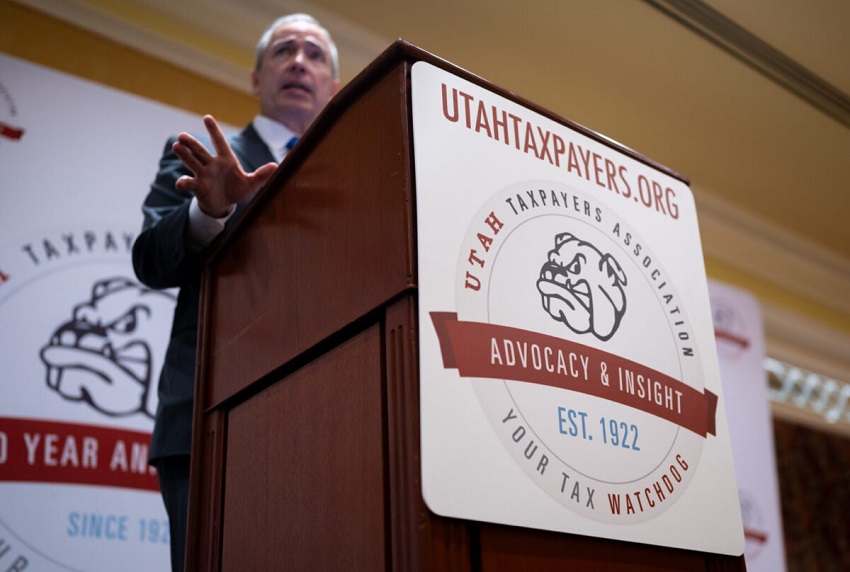Ogden, UT – As Utah heads into its 2025 legislative session, Governor Spencer Cox and Republican lawmakers are once again prioritizing tax cuts, marking the fifth consecutive year of reductions in the state’s income tax rates. Since 2021, more than $1.2 billion in tax cuts have been implemented, and Cox is pushing for more, including a proposed repeal of taxes on Social Security income.
Despite the continued focus on tax cuts, Cox has also emphasized the growing need for a broader discussion on tax reform. Speaking at an annual conference hosted by the Utah Taxpayers Association in Salt Lake City, Cox acknowledged that while income tax cuts have been a central feature of his administration, the state must eventually address the structure of its entire tax system.
“We’ve got to get really serious about what our tax code looks like moving forward,” Cox told the audience. “I feel like we’re kind of piecemealing it along, and I don’t think that’s a great way to do things.”
Cox, beginning his second term as governor, reiterated that while he supports further income tax reductions, his ultimate goal is to eliminate the state’s income tax altogether. He pointed to states like Texas, which lack an income tax but rely heavily on property taxes, warning that such a shift in Utah’s tax structure could lead to higher property taxes for residents.
“If we eliminate the income tax like Texas, we might end up tripling our property tax bills,” Cox said. “I think it’s a mistake to just keep piecemealing things. We need to have a larger vision.”
However, despite Cox’s call for reform, legislative leaders have shown little enthusiasm for undertaking a broad discussion on tax restructuring in the upcoming session. House Speaker Mike Schultz and Senate President Stuart Adams have both signaled support for another income tax rate cut, as well as a partial expansion of the Social Security tax credit, though they have indicated that a major tax reform package is not on the horizon for 2025.
Schultz, in particular, expressed his preference for targeted tax cuts. “We have a limited amount of money,” he said. “If we had all the money, I’d love to go all the way and take the Social Security tax completely off the table.” He also suggested that income tax cuts, which disproportionately benefit wealthier taxpayers, should be prioritized alongside any changes to Social Security taxes.
The governor’s proposal to eliminate the tax on Social Security income has generated significant interest, particularly among seniors. However, some lawmakers, including Senator Dan McCay, have expressed reservations about the fairness of such a move. McCay, who chairs the Senate Revenue and Taxation Committee, argued that cutting taxes for wealthier retirees could place a greater burden on teachers and public employees who fund these tax cuts.
“I’ve always believed in a broader base and a lower rate,” McCay said, advocating for a tax system that benefits all Utahns rather than focusing on specific groups. “I’m concerned about carving out special tax credits and creating inequities.”
While Cox’s proposal to eliminate Social Security taxes has garnered broad support among seniors, McCay’s stance reflects a growing debate about the state’s tax priorities. Some legislators, including House Minority Leader Angela Romero, have voiced opposition to additional income tax rate cuts, arguing that such reductions provide minimal relief to low-income earners.
Romero also stressed the need to redirect funds to other pressing issues, such as affordable housing and homelessness services, rather than further reducing taxes for higher-income groups.
Despite the ongoing debate, Utah’s tax system remains a key point of contention in the state’s legislature. While some lawmakers are pushing for incremental cuts, others, including former Governor Mike Leavitt, have called for a more comprehensive tax overhaul to address Utah’s changing economy and the growing imbalance between income and sales tax revenues.
For now, the 2025 session seems set to continue Utah’s tradition of gradual tax cuts, but the broader issue of tax reform may remain on the back burner—at least for another year. As Cox noted, however, the state cannot continue indefinitely without tackling the structural issues that could ultimately pose a challenge for future budgets.

